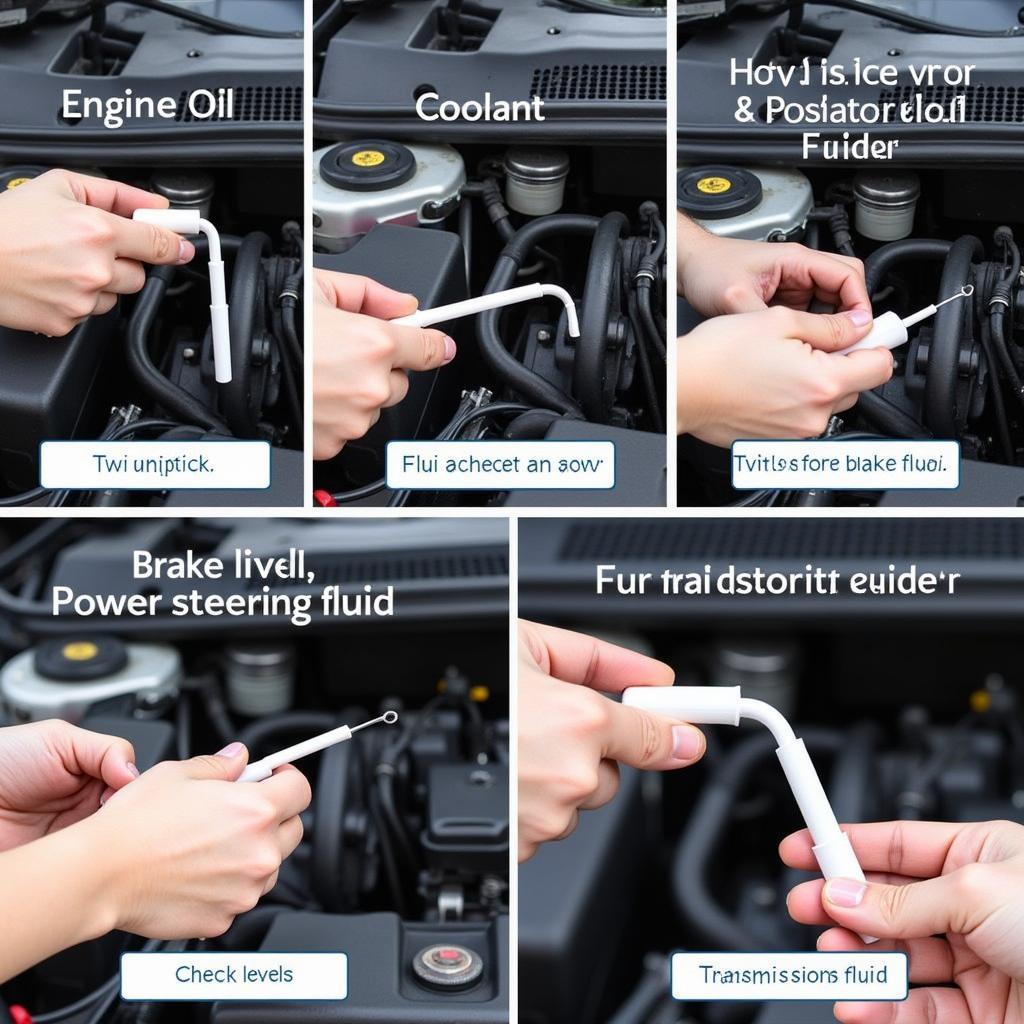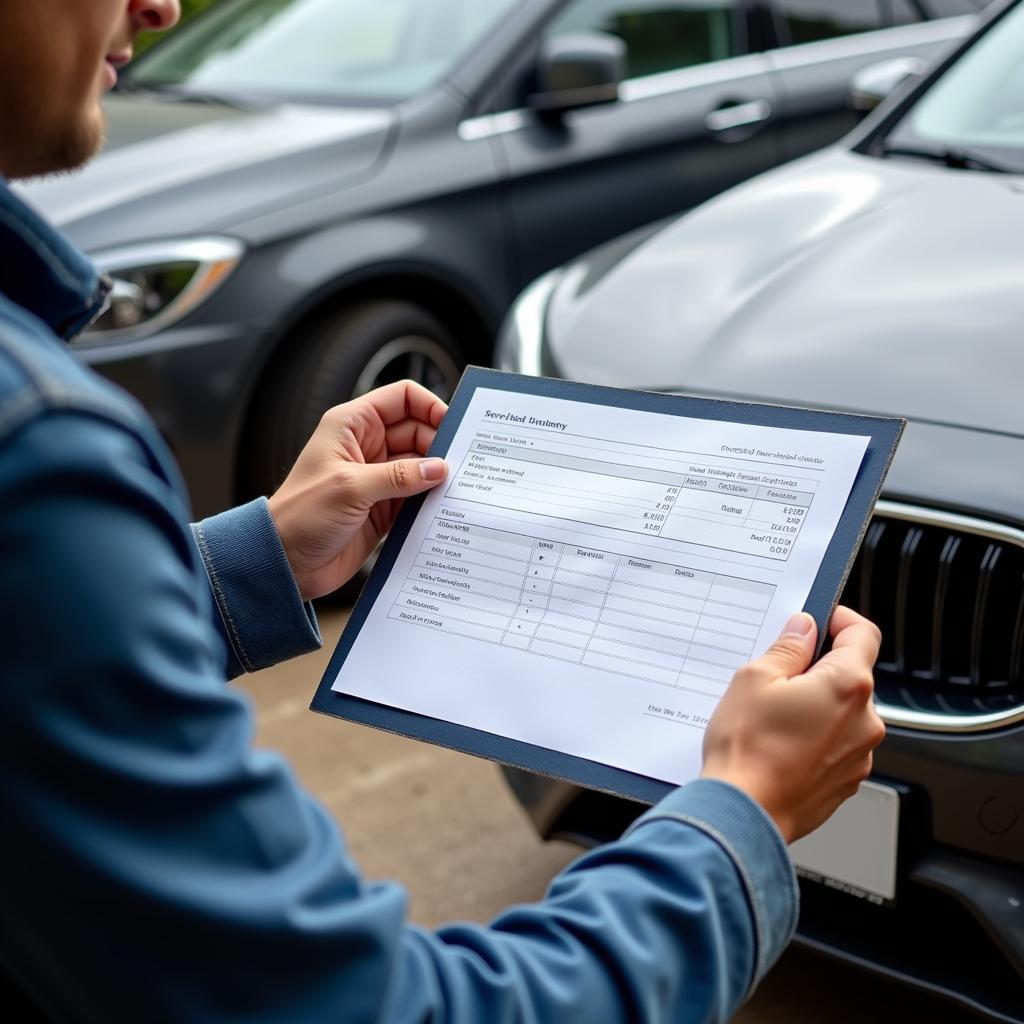How to Service Your Car Engine
Maintaining your car engine is crucial for optimal performance, fuel efficiency, and longevity. Understanding How To Service Your Car Engine can save you money in the long run and prevent costly repairs down the road. This comprehensive guide will equip you with the knowledge and steps necessary to keep your engine running smoothly.
Regular engine service goes beyond just changing the oil. It involves a series of checks and procedures to ensure all components are functioning correctly. From checking fluids to replacing filters, each step plays a vital role in your engine’s health. Wondering who has the best car buying service? Check out our guide for some helpful tips.
Essential Engine Service Tasks
Checking Vital Fluids
Regularly checking your engine’s vital fluids is the cornerstone of preventative maintenance. This includes:
- Engine Oil: The lifeblood of your engine, oil lubricates moving parts, reducing friction and heat. Check the oil level using the dipstick and ensure it falls within the recommended range. Oil changes should be performed according to your car’s manufacturer recommendations.
- Coolant: Keeps the engine from overheating. Check the coolant level in the reservoir and top it off if necessary. Also, inspect for leaks and ensure the coolant is the correct color and consistency.
- Brake Fluid: Essential for safe stopping. Check the brake fluid level in the master cylinder reservoir. Low brake fluid can indicate a leak or worn brake pads.
- Power Steering Fluid: Ensures smooth steering operation. Check the power steering fluid level and look for leaks.
- Transmission Fluid: Keeps your transmission running smoothly. Check the transmission fluid level using the dipstick when the engine is warm and running. The fluid should be red and not smell burnt.
 Checking Engine Fluids: Oil, Coolant, Brake Fluid
Checking Engine Fluids: Oil, Coolant, Brake Fluid
Do you know how much does usaa car buying service save? Find out more in our detailed article.
Replacing Filters
Filters prevent contaminants from entering your engine and other vital systems. Regularly replace the following filters:
- Oil Filter: Removes dirt and debris from the engine oil, preventing premature engine wear. Replace the oil filter with every oil change.
- Air Filter: Cleans the air entering the engine, ensuring optimal combustion. A dirty air filter can reduce fuel efficiency and engine performance.
- Cabin Air Filter: Filters the air entering the cabin, removing pollen, dust, and other allergens.
If you are considering buying a car, you might be interested in whether does carmax service the cars they sell. Our article provides a comprehensive overview.
Inspecting Belts and Hoses
Inspecting belts and hoses for cracks, wear, and leaks is essential. A broken belt can lead to engine failure, while a leaking hose can cause overheating.
- Serpentine Belt: Drives various engine accessories, such as the alternator, power steering pump, and water pump.
- Timing Belt: Synchronizes the movement of the engine’s valves and pistons. A broken timing belt can cause catastrophic engine damage.
- Radiator Hoses: Carry coolant between the engine and radiator.
- Heater Hoses: Carry coolant to the heater core.
Are you curious about the stc charge for car service? Our guide breaks down this common fee.
Advanced Engine Service
While the tasks mentioned above can be performed by DIYers, more complex engine service procedures, such as spark plug replacement, fuel injection cleaning, and valve adjustments, are best left to qualified mechanics.
“Regular maintenance is the key to a long and healthy engine life. Don’t wait until something breaks to take care of your car,” advises John Smith, Senior Automotive Technician at Certified Auto Repair.
Does costco have a car buying service? Learn more about Costco’s auto program in our dedicated article.
Conclusion
Knowing how to service your car engine is an investment in its longevity and performance. By following these guidelines and performing regular maintenance, you can avoid costly repairs and keep your engine running smoothly for years to come. Remember, consistent care is crucial for optimal engine health.
FAQ
- How often should I change my engine oil? Refer to your car’s owner’s manual for the recommended oil change interval.
- What type of oil should I use? Use the oil viscosity recommended by your car’s manufacturer.
- How can I tell if my air filter needs to be replaced? Inspect the air filter for dirt and debris. If it appears dirty, replace it.
- How often should I check my coolant level? Check your coolant level at least once a month.
- What should I do if I see a leak under my car? Take your car to a qualified mechanic to diagnose and repair the leak.
- How can I improve my car’s fuel efficiency? Ensure your tires are properly inflated, follow the recommended maintenance schedule, and avoid aggressive driving.
- What are the signs of a failing water pump? Common signs include overheating, coolant leaks, and a whining noise from the engine.
Need help with your car engine service? Contact us via WhatsApp: +1(641)206-8880, Email: [email protected], or visit us at 456 Oak Avenue, Miami, FL 33101, USA. We offer 24/7 customer support.

